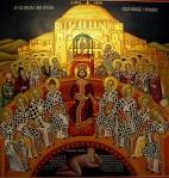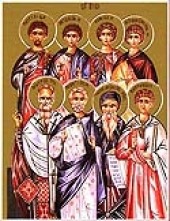You are currently browsing the daily archive for July 3, 2010.
“Let love be without hypocrisy….Bless those who persecute you; bless and do not curse”. (Romans 12:9; 14)

Elder Paisios of the Holy Mt. Athos on “Faith and Love”
(taken from “Spiritual Awakening”)
– Geronda, what is the relationship between faith and love?
– First comes faith and then love. One must believe in order to love. One can not love something he does not believe in. So to love God we must believe in God. The greater our faith, the greater our hope and love and sacrifice for God and our neighbour. A fervent faith in God brings forth a fervent love for God and for the image of God, our fellow man. Out of the abundance of our love – that cannot be contained in the heart and overflows – the poor animals also benefit. We believe strongly and we love strongly. If our faith is lukewarm, our love will be lukewarm. If our faith is fervent, our love will be fervent.
Our faith must have philotimo (1), and that’s where the philotimo-filled struggle begins. And the more we struggle with philotimo, the more our faith will increase, and the more our love will increase. In this philotimofilled struggle, it helps greatly to keep God’s blessings in mind. Someone who has a strong sense of philotimo does not wonder if there is Paradise, but struggles, because he believes and loves God. Whereas someone who does not have philotimo will begin to wonder, “Why should I even struggle? Does Paradise really exist? Will there be a Judgment Day?” And when someone is ungrateful, no matter what you do for him, he will still be ungrateful. Whereas the man who has philotimo praises God even in a time of temptation and will gradually start being continuously grateful to God. That’s when the divine transformation comes to his soul, keeping him in constant joy and gladness. Another person may have no temptations or trials of any kind, and only have blessings, and yet will never be satisfied with anything.
After our love for God, comes sacrifice. And when there is sacrifice without any trace of selfishness, then one begins to be blessed with divine events. I must make a sacrifice for no other reason than for God Who created this universe and provides us with so many blessings. You see, even the pagans who deified aspects of nature, worshipping the sun, the great rivers, often sacrificed themselves for this faith of theirs. If they sacrificed themselves for creation, how much more should we sacrifice ourselves for the Creator!
People don’t believe and so they don’t sacrifice themselves. All our indifference stems from this. One blasphemes and curses the holy and sacred things, while another half-believes and is tormented. For one to have true, spiritual joy, he must have faith and love.
______________________________________________________________________________
(1) philotimo – according to Elder Paisios, is the reverent distillation of goodness, the love shown by humble people, from which every trace of self has been filtered out.Their hearts are full of gratitude towards God and their fellow men, and out of spiritual sensitivity and a sense of honour they try to repay the slight good which others do for them.

“Bless and do not curse” with Geronda Paisios
(in “With Pain and Love for the Contemporary Man”)
Someone asked me, “Isn’t the hymn we chant during the Great Lent, Bring more evils upon them, 0 Lord, bring more evils upon those who are glorious upon the earth (Is. 26:15) a curse? And if it is, why do we still chant it?” “When the barbarians are attacking,” I replied, “and are ready to destroy a people just like that, and the people are praying that their enemies encounter obstacles, that their chariots break down and their horses get harmed, is that good or bad? That’s what it means: that they may run into obstacles. It’s not a curse.”
– Geronda, when will a curse stick?
– The curse sticks when injustice is involved. If someone for example, deceives a grieved person or does them harm and that person curses them, then the whole family can be adversely affected. In other words, when I harm someone and that person curses me, the curse will stick. God allows the curse to take effect as He may, for example, allow a person to kill someone. But when there is no injustice involved, then the curse returns to the person who gave it.
– And how is one released from a curse?
– With repentance and confession. I know of many cases of people who suffered from curses, and when they realized that they had been cursed because they had wronged someone, they repented, went to confession and everything was fine after that. If the wrongdoer says, “My God, I have done such and such a sin, forgive me … ” and confesses with pain and honesty, God will forgive him. He is God, after all.
– Does punishment come only to the person who has been cursed or does it also come to the one who cursed him?
– The cursed person suffers in this life. But the one who curses suffers in this life and in the next one, for, unless he repents and goes to confession, God will treat him like a criminal. Of course someone who has hurt you has caused you pain, but to put a curse on him is like taking a gun and shooting him. Who gives you the right to do that? No matter what the other person has done to you, you don’t have the right to kill him. Those who curse have malice in their heart. And the curse sticks when it’s spoken with passion and indignation.
Now, when a curse comes from a just person, it becomes very powerful, especially when it comes from someone like a widow. I remember an old lady who had a small horse which she used to leave at the end of the forest to graze. Because the horse was a bit wild, she was using a strong rope to tie it. Once, three women went to the forest to cut wood. One of them was rich; the other one was a widow and the third was a very poor orphan. They saw the grazing horse tied with the rope and thought to themselves, “Why don’t we take the rope to tie our bundles of wood?” So, they cut it in three pieces and each of them got a piece to tie their bundle. The horse cut loose of course and ran away. When the old woman came back and did not find it, she became very upset. She started looking for it everywhere and went through a lot of trouble to find it. When the old woman finally found it, she said with indignation, “May the person who stole the rope be tied by it.”
One day, the brother of the wealthy woman was fooling around with a gun he wrongly thought was empty (it was left behind by the Italians after the War) and the bullet hit his sister in the neck. They had to take her to the hospital and they needed a rope to tie her on a wooden ladder they used as a stretcher. They found the stolen rope but it was not long enough. The other two neighbours brought the pieces of rope that they had stolen, tied her on the ladder and carried her to the hospital. This way, the old woman’s curse came true: “Let them be tied by it.” She has since died, may God rest her soul. You see how her curse stuck to the rich woman who had no financial need. The others were very poor and for this reason their offence was less grave .
The so – called “Polite” Curse
– Geronda, when someone wrongs us, is it right to think or say, “May he find his punishment from God”?
– Whoever says this is being tricked by the devil and does not realize that this is a “polite” way of cursing the person. There are some people who like to see themselves as sensitive, loving and refined, and tolerant of the wrongs they suffer. Yet, they still say, “May he find his punishment from God.” In this life, we are all taking the test to enter the eternal life, to enter Paradise.
My mind tells me that this kind of “polite” curse is below the passing grade and is not right for a Christian, because Christ did not teach us this kind of love. He taught us to say, Father, forgive them, for they know not what they do. (Lk. 23: 34) Likewise, the best blessing is to remain quiet while being cursed and accept with kindness the curses leveled against us.
If we suffer slander and injustice in the hands of frivoIous or cunning people, who are full of malice and distort the truth, we should try if we can, not to defend ourselves against them, especially if the injustice is about ourselves only. Neither should we say, “May they find their punishment from God,” because this is a curse, too. The best is to forgive them with all our heart and to ask God to give us the strength to bear the burden of slander, while continuing our spiritual life quietly and undetected as much as we can. Let those, who have it as their habit to judge and condemn others, continue to wrong us, because in this way they are preparing golden laurels for us in the true life. Naturally, all those who are close to God never curse because there’s no malice in them. They have only goodness and gentleness, and the bad things people throw upon these holy souls are sanctified, and they feel a great, hidden joy.
A Blessing from the Heart is Divine
Now let me give you a “curse” too! May God flood your heart with His kindness and His abundant love until you go out of your mind! May your mind leave this earth even while you are in this life and stay close to Him! May you go mad with the divine madness of God’s love! May God bum your hearts with His love! Don’t ask me for a second curse; this good “curse” of mine works because it comes straight from my heart.
I had felt so sorry for you when I was at the sanatorium (in 1966). Some of you had been waiting for eight years. “We will build a Monastery,” you were saying time and again, but no Monastery would be built. You had lost hope. Then I thought to myself, “As soon as I get out of the hospital, the Monastery will grow like a mushroom!” And that’s what happened! In a year’s time, the Monastery was ready! And it was because what I said, I said it with my heart and you also had good intention, and God did not abandon you. Nothing else can explain what happened!
When you feel pain in your heart for a person, who is humble and asks you from his heart to pray for example, for some passion that torments him, and you tell him “Don’t be afraid, you’ll get better,” the blessing you give is divine. It’s full of love and pain, and that’s why it works. It pleases God and He makes the blessing come true. You see, even the pain we feel for someone is a kind of blessing.
Once, when I was in the army, the Commander sent me to deliver an offering to a small Chapel of Saint John the Prodromos (Forerunner) because the Saint had helped us during the war. I was to buy two candelabra for the Chapel and, at the same time, to escort someone who was going to be tried in the military court in Naupaktos. The others told the Commander, “You found the right person to deliver him!” The poor soul was from Epeirus, a musician of sorts, an impoverished man, married with children, who had been accused of wounding himself to avoid going to war. I suppose he thought to himself, ‘‘I’d rather be with one leg than get killed.” We went together down to Agrinio where he knew some people. “Let’s go and see them,” he told me and I replied, “Let’s go.” “Let’s go here, let’s go there,” he would say, and I followed. What could I do? It was quite tiresome. And he did not want me to turn him in. I really felt pity for him and at some point I said, “Don’t worry, you’ll see, you’ll do better than all the others. The Commander will write a letter and they will probably put you in some office, and you’ll take care of your family and save your life too.” Well. when we finally reached Naupaktos we found out that indeed, the Commander had sent a letter and the man had been exonerated. Otherwise, he would have been brought before the firing squad. Things are very strict during war time. The Commander took pity on him and he was hired as a cook in the Transit Centre. He even brought his family to be with him, and they lived better than all the others. There was plenty of left over food, because the soldiers did not always go to eat there. So he got to feed his children. Everybody later would tell him, “You’ve had it better than anyone else.” You see the rest of us were up in the mountains, in the snow. The blessing I gave him found favour with God because I said it feeling the man’s pain in my heart, and that’s why God acted on it.
I remember another case in Konitsa, when I was at the Holy Stomion Monastery dedicated to the Nativity of the Theotokos.11 After the Feast of the Panaghia on September 8, the pilgrims had left the place very untidy. As I was fixing something, I see that my sister and another girl had stayed behind, cleaning up. The poor girl had two sisters – she was the youngest – who had married, while she remained single. She had so much philotimo. They stayed and leaned up everything and at the end she said to me, “Father, if you need us for anything else, we’ll stay.” “So much philotimo,” I thought to myself. Therefore, I go to little Chapel and I say with all my heart, “My sweet Panaghia, take care of her. I don’t have anything to give her” – and even if I did, she would not accept it. Well, as soon as she went back home, a young man was waiting her, a fellow I knew because we were together in army, a really nice person, a piece of gold and from a good family. They got married and everything turned out so well! See how the Panaghia rewarded her!
_______________________________________________________________
(11) The word Theotokos (or Panaghia) is an important theological term referring to the Virgin Mary. It is a Greek word meaning the Birth-giver of God.

“But Jesus, knowing their thoughts, said: “Why do you think evil in your hearts? For which is easier, to say, ‘Your sins are forgiven you,’ or to say, ‘Arise and walk’? “But that you may know that the Son of Man has power on earth to forgive sins”-then He said to the paralytic, “Arise, take up your bed, and go to your house.”
(Mt. 9:4-6).
“Concerning the Forgiveness of Sins” with St. Nektarios of Pentapolis
The person who has sinned against God is in need of reconciliation. The appearance of our Lord Jesus Christ and the authority He gave to His Apostles to forgive sins bear witness to this. If the forgiveness of sins was not necessary for the cure of the soul, then neither was the forgiveness of the world’s sins necessary nor was it necessary for the Apostles to be empowered with such authority while being sent to preach the Gospel. Faith in Christ and baptism alone would suffice, and God could have kept this authority to forgive sins for Himself£ However, He gave the Apostles the authority not only to forgive sins but also to bind them: he gave them the power to bind and loose. “Whosoever sins ye remit, they are remitted unto them; and whosoever sins ye retain, they are retained” (Jh. 20:23). This authority given to them so definitively confirms it to be a necessary component and offspring of the apostolic mission. If then the established Church received this apostolic mission in order that She may continue it, it follows that She also received the right to bind and loose.
The authority to bind and loose was given to the Church and was exercised, as we mentioned, from the apostolic age. This is witnessed by the Apostle Paul himself when he commands the Corinthians to sever from the Church the person who fornicated with his father’s wife and to hand him “unto Satan for the destruction of the flesh, that the spirit may be saved in the Day of the Lord Jesus” (1 Cor.5:5).
As was shown from the manner with which it was used, the power to bind and loose was given to preserve the holiness of the Church, so that She may remain holy and immaculate. Because, as the Apostle Paul says, our Lord Jesus “loved the church and gave Himself for it, that He might sanctify and cleanse it with the washing of water by the Word, that He might present it to Himself a glorious church, not having spot or wrinkle or any such thing, but that it should be holy and without blemish” (Eph. 5:26-27). This authority enables the Church to maintain Herself holy and immaculate, and to become true yeast, so that She may ferment the entire dough: “For if the first fruit be holy, the whole lump is also holy; and if the root be holy, so are the branches” (Rom. 11:16).
If the Church lacked this power, She would be incapable of fulfilling Her mission. Otherwise, how would She be able to preserve Herself holy and immaculate? How would She keep out the defiled from the assembly, or how would She receive them who have repented? What type of awareness would She have of the moral state of Her members? How would She know that She is giving the holy things to the holy people (21) or that She is not depriving these holy things from them who have already appeased God through repentance?
_______________________________________________________________
21 – Here, Saint Nektarios is referring to the Canons of the Orthodox Church, which were compiled by Saint Nicodemos into one book known as The Rudder. Almost all the Canons clearly impede them who have fallen into deadly sins from receiving Holy Communion for a certain period of time, and this is how the Church differentiates between pure and impure, and how She avoids placing the pearls before swine. From Saint Nektarios’ words, it is evident that these Canons are valid and that the necessary penance should be administered to the repentant. This is also apparent from the letter given by the Bishop to priests, which grants them the ability to hear confessions. Among other things, it also advises the following to the spiritual father: “Hence, you will bind what must be bound, while you will loose things worthy of being loosened.”
The authority to bind and loose is and will be the power that maintains the Church holy and immaculate. This is why the Church has not ceased exercising this great authority since the apostolic years. They who are concerned about the salvation of their souls are obliged to run towards the Church as to the only clinic, because otherwise there is no salvation. The Lord called all the heavy laden and burdened in order to give them rest. The Church, continuing Christ’s work, calls those burdened by sins in order to give them rest. How would they who fall into sins be given rest if the Church did not have the authority to bind and loose? How would the nations be given rest unless the Apostles had the authority to forgive sins? How would the apostolic mission be continued if the Church had not inherited this apostolic gift? Only the Church is capable of alleviating them who are burdened by the weight of sin.
Cyril of Alexandria, interpreting verse twenty-three in the twentieth chapter of St. John (Whosoever sins ye remit, they are remitted unto them; and whosoever sins ye retain, they are retained), says: “The spirit-bearing men either remit or retain sins in two ways. Namely, they call to baptism the people who have been tested in the faith and pious way of life, or they prohibit and expel the divine grace from some people who have not yet become worthy. Or in another manner, they punish the children of the Church who sin while forgiving them that repent, just as Paul handed over the fornicator in Corinth unto destruction of the flesh (so that the soul may be saved) while admitting him back later, lest he should be swallowed up with overmuch sorrow” (2 Cor. 2:6-7).
Both the lofty mission of the Church as well as Her divine nature oblige Her members to maintain Her holy and immaculate, without stain, wrinkle, or any such thing; so that, as a beloved bride of Christ, cleansed through the blood of Christ, She may be holy and immaculate; so that, having as Her mission to ferment the entire dough, She may fulfill Her great purpose. They who are burdened by sins and who delight in them and yet are in communion with the Church defile the Church’s sanctity and impede the role of Her great mission. It is necessary that the members of the Church be holy and immaculate. As Saint Paul attests: “He hath chosen us in Him before the foundation of the world, that we should be holy and without blame before Him in love, having predestined us unto the adoption of children by Jesus Christ to Himself, according to the good pleasure of His will” (Eph. 1:4-6).
Unrepentant Christians who ignorantly sin in this manner are obliged to realize that they store up for themselves great condemnation and that the condemnation’s recompense will be threefold, because: (I) they have transgressed the commandments and trampled God’s Law, having become slaves of sin, (II) they have added stains, wrinkles, and blemishes to the Church, and (III) they have disrupted the Church’s work by staining the Church and by personally resisting the Church’s mission. This is why the divine Chrysostom would say: “If we were truly Christians, the idolaters would have come to Christ.” We, therefore, disrupt the work of the Church when we do not walk according to Christ, and when we wage war against Her. Therefore, beloved, let us persist in iniquity no longer, but let us change our thoughts and sanctify ourselves through the forgiveness of our sins, so that we are not condemned for this triple offense. Let us give the necessary satisfaction, so that we may satisfy the Divine Righteousness and propitiate God.22
______________________________________________________________
(22) – They who reject the idea of the necessity of satisfying/compensating Divine Righteousness as a denial of the satisfaction made by our Savior Christ to God the Father, these people neglect that this is in reference to sinful Christians and not to unbelievers. Yes, reconciliation has already been made through Jesus Christ. St. Nicodemos says that “the satisfaction and payment made by our Lord on behalf of our sins was so bountiful and rich that this satisfaction resembles a boundless ocean, while all the sins of humanity-past, present, and future-represent a drop of water” (Unseen “Warfare, p. 207). However, having sinned after baptism, we have “saddened” the Savior Himself, and it is Him Who we are seeking to please through repentance, confession and good works. This is what St. Nektarios is calling “satisfaction of Divine Righteousness.” This is what all the Saints have spoken about in their own manner. St. Mark the Ascetic says: “A sinner cannot escape retribution except through repentance appropriate to his offense” (Philokalia, Vol. I, p. 130). St. Maximos the Confessor says: “No sinner can escape future judgment without experiencing in this life either voluntary hardships or afflictions he has not chosen” (Philokalia, Vol. 2, p. 76). St. Thalassios says: “All sin is due to sensual pleasure, all forgiveness to hardship and distress. If you are not willing to repent through freely choosing to suffer, unsought sufferings will providentially be imposed on you” (Philokalia, Vol. 2, p. 317). And St. Gregory of Sinai says: “Requitals correspond to our deserts, even if many people think they do not. To some, Divine Justice gives eternal life; to others, eternal chastisement. Each will be requited according to his actions according to whether he passed through this present life in a virtuous or in a sinful manner” (Philokalia, Vol. 4, p. 219).

(taken from: “Repentance and Confession” @ St. Nektarios Monastery,
Roscoe, NY)



 Christian Dogma
Christian Dogma Christian Martyrs
Christian Martyrs Christian Orthodox Churches and Monasteries
Christian Orthodox Churches and Monasteries Christian Sermons and News
Christian Sermons and News Church's Teachings on Fasting
Church's Teachings on Fasting Ecumenism – a Great Heresy
Ecumenism – a Great Heresy Father George Calciu
Father George Calciu Life_a Sacred Gift form God
Life_a Sacred Gift form God Orthodox Saints and Church Fathers
Orthodox Saints and Church Fathers Spiritual Elders
Spiritual Elders Daily Bible Readings
Daily Bible Readings Journey to Orthodoxy
Journey to Orthodoxy Listen to Ancient Faith Radio
Listen to Ancient Faith Radio Orthodox Calendar of Feasts and Saints
Orthodox Calendar of Feasts and Saints Orthodox Christian Mission Center
Orthodox Christian Mission Center Orthodox Institute
Orthodox Institute OrthodoxChristianNetwork TV
OrthodoxChristianNetwork TV
Recent Comments